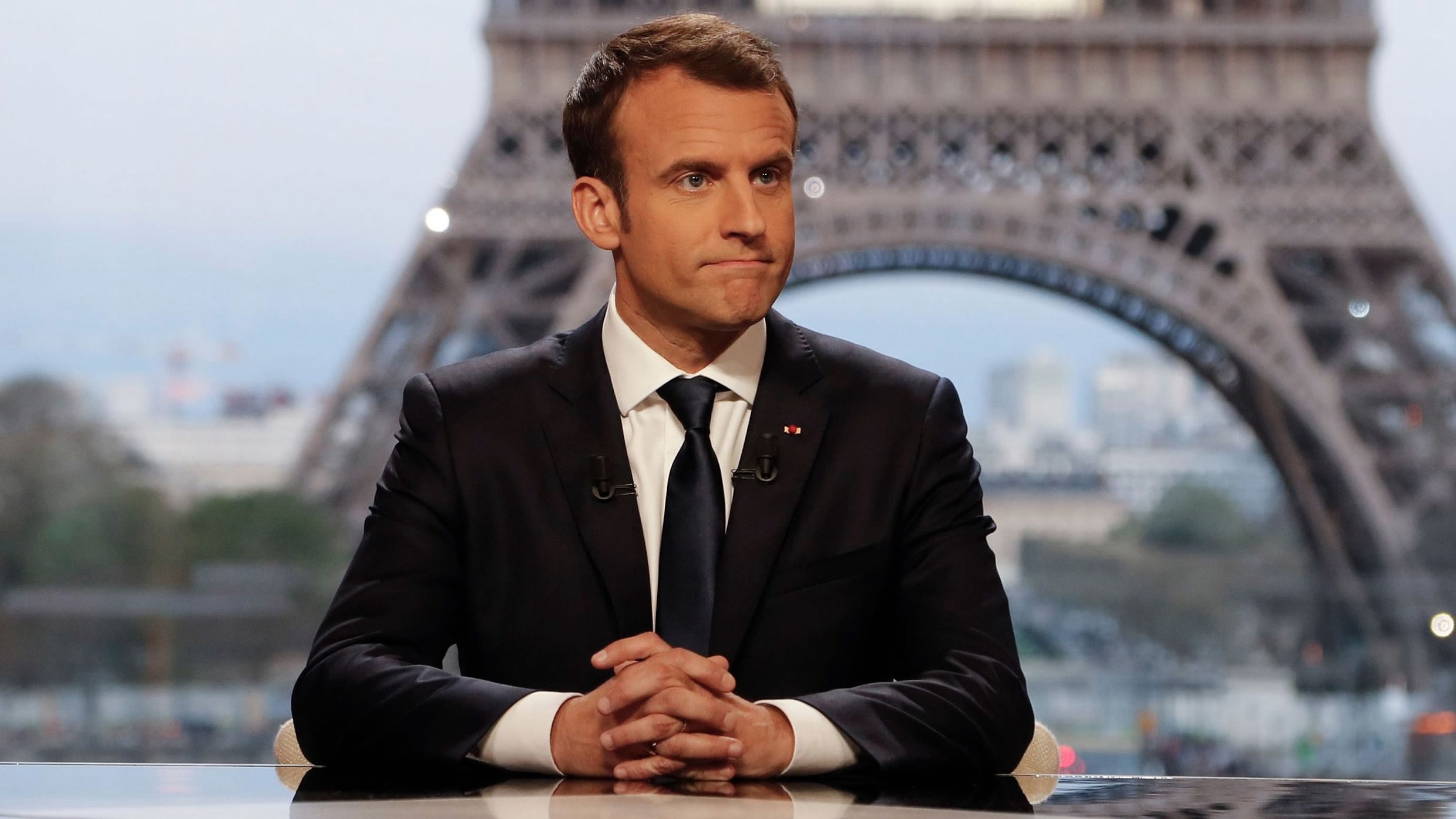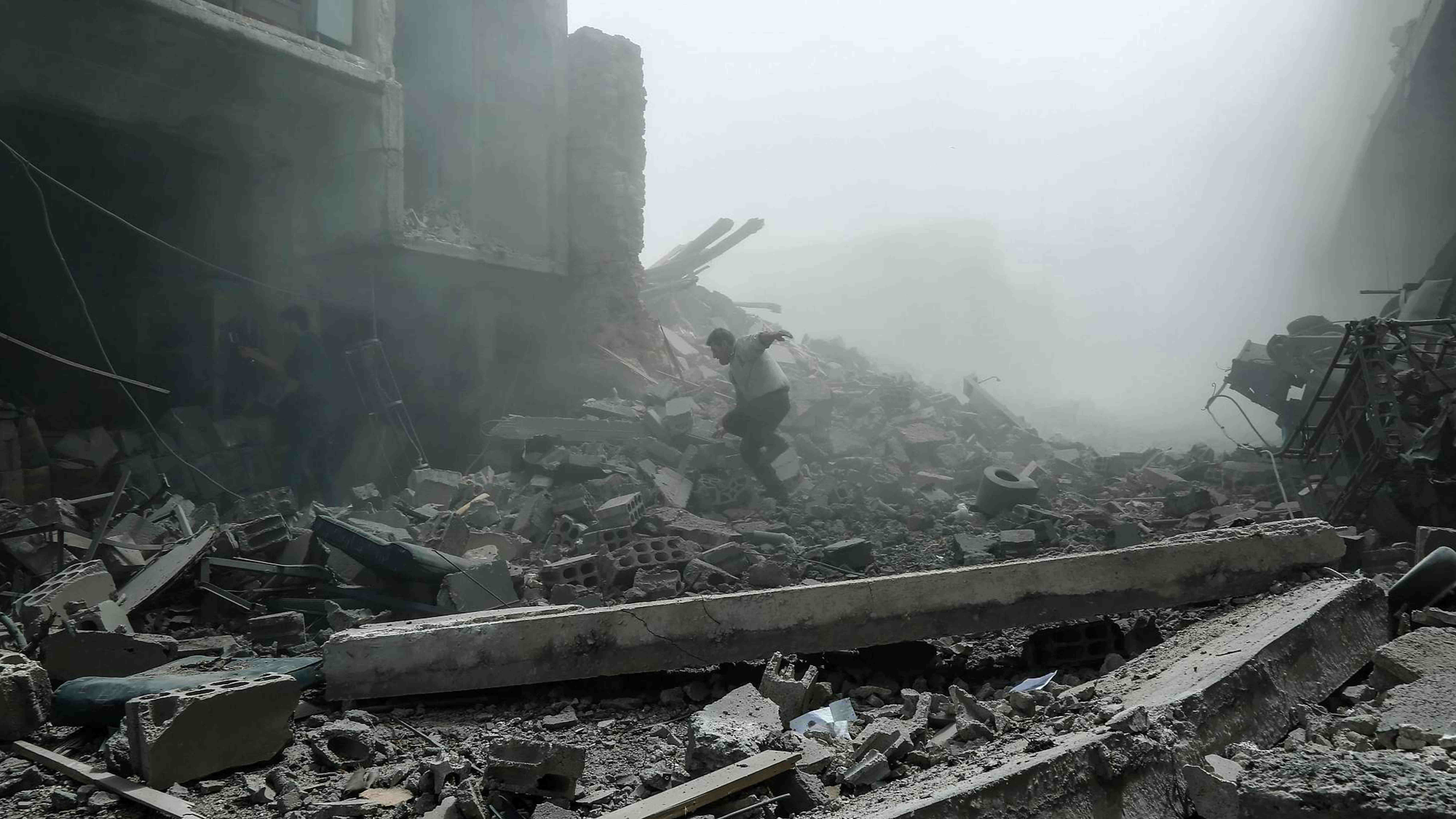
Politics
10:34, 16-Apr-2018
Macron insists Syria strikes had 'complete international legitimacy'
CGTN

The three Western countries behind the airstrikes on Syria defended their actions on Sunday, arguing the move was a necessary and legitimate warning to the Syrian government.
Saturday's strikes targeted three alleged chemical weapons facilities in response to what the West says was a gas attack on Douma that killed dozens of people. The Syrian government denies responsibility and Russia has claimed the attack was staged.
Inspectors from the Organisation for the Prohibition of Chemical Weapons are in Syria, and are due to examine the site of the alleged chemical attack in the coming days.

Smoke rises from a scientific research facility in Barzeh, a suburb of Damascus, following US-led strikes against Syrian President Bashar al-Assad's government, April 14, 2018. /VCG Photo
Smoke rises from a scientific research facility in Barzeh, a suburb of Damascus, following US-led strikes against Syrian President Bashar al-Assad's government, April 14, 2018. /VCG Photo
Observers have questioned why the US, Britain and France did not wait until the results of the investigation were carried out before acting, but on Sunday French President Emmanuel Macron insisted that there was proof of chemical attacks.
"We had reached a point where these strikes were necessary to give back the (international) community some credibility,” Macron said during a near three-hour live interview on French television.
Macron: Strikes were legitimate
Macron argued the operation was legitimate despite not being sanctioned by the UN, retorting that under a 2013 UN resolution Syria was supposed to destroy its chemical weapons arsenal.
"We have not declared war on the regime of Bashar al-Assad," the 40-year-old president said, before urging international powers to now push for a diplomatic solution to the seven-year war.
France, Britain and the US had “complete international legitimacy to act,” he added.
Macron also claimed that Paris had convinced Donald Trump to stay engaged in Syria "for the long-term" and take part in the airstrikes.

French President Emmanuel Macron (C) poses before an interview at the Theatre National de Chaillot in Paris, April 15, 2018. /VCG Photo
French President Emmanuel Macron (C) poses before an interview at the Theatre National de Chaillot in Paris, April 15, 2018. /VCG Photo
"Ten days ago, President Trump was saying the United States of America had a duty to disengage from Syria," Macron said during the live interview. "I assure you, we have convinced him that it is necessary to stay for the long-term."
"The second thing is that we have also convinced him that he must limit his strikes to chemical weapons, at a time when there was a media furore via tweet, as I'm sure you noticed."
Like Trump and British Prime Minister Theresa May, Macron has faced a domestic backlash for striking Syria without consulting parliament – he defended the move as being within his constitutional powers.
May to face UK parliament
May is expected to face criticism on Monday for bypassing parliament to join the strikes against Syria, with some lawmakers calling for a vote on her future strategy. She will make a statement to parliament on her decision to join the US and France in Saturday's strikes.
The prime minister will repeat the assertion that Britain was "confident in our own assessment that the Syrian regime was highly likely responsible" and that it could not wait "to alleviate further humanitarian suffering caused by chemical weapons attacks," according to excerpts of her speech released to Reuters.

Theresa May, UK prime minister, addresses members of the media during a news conference at 10 Downing Street following airstrikes on Syria, in London, UK, April 14, 2018. /VCG Photo
Theresa May, UK prime minister, addresses members of the media during a news conference at 10 Downing Street following airstrikes on Syria, in London, UK, April 14, 2018. /VCG Photo
But May is also likely to be grilled over why she broke with a convention to seek parliamentary approval for the action, a decision that she says was driven by the need to act quickly.
Jeremy Corbyn, leader of the main opposition Labour Party, has questioned the legal basis for Britain's involvement and called for new legislation to limit the government's power to launch military action.
Britain has said there are no plans for future strikes against Syria, but Foreign Secretary Boris Johnson warned on Sunday that all options would be considered if chemical weapons were used against Syrians.
US 'work not done'
US ambassador to the UN Nikki Haley told Fox News Sunday "our work in Syria is not done," meanwhile, adding that further US measures depended on Assad's response.
"We know that it is now up to (Syrian President) Bashar al-Assad on whether he is going to use chemical weapons again, and should he use it again, the president has made it very clear that the United States is locked and loaded and ready to go," she said. "If Assad doesn't get it, it's going to hurt."

White House spokeswoman Sarah Sanders told ABC's "This Week" on Sunday that the strikes "100 percent met their objectives."
Longer-term, she said, Trump had three ultimate objectives in Syria: to defeat ISIL, to contain Iranian aggression and to halt the use of "mass chemical weapons."
Trump on Sunday defended his use of the phrase "Mission Accomplished" to describe the airstrikes.
The phrase, which evoked former President George W. Bush's premature Iraq victory speech on board the aircraft carrier USS Abraham Lincoln in 2003, was criticized by Democrats as incautious and provoked bemusement and derision on social media.

Twitter Screenshot
Twitter Screenshot
Trump resurrected the phrase in a tweet on Saturday after the airstrikes.
Putin warns of chaos
Russian President Vladimir Putin warned on Sunday that further Western attacks on Syria would bring chaos to world affairs, as Washington prepared to increase pressure on Russia with new economic sanctions.
In a telephone conversation, Putin and his Iranian counterpart Hassan Rouhani agreed that the Western strikes had damaged the chances of achieving a political resolution in the seven-year Syria conflict, according to a Kremlin statement.
Haley told CBS' Face the Nation program that the US would announce new economic sanctions on Monday aimed at companies "that were dealing with equipment" related to Assad's alleged chemical weapons use.
(With input from agencies)

SITEMAP
Copyright © 2018 CGTN. Beijing ICP prepared NO.16065310-3
Copyright © 2018 CGTN. Beijing ICP prepared NO.16065310-3